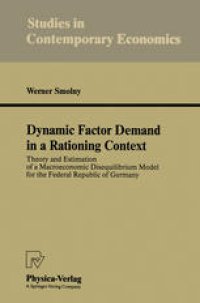
Ebook: Dynamic Factor Demand in a Rationing Context: Theory and Estimation of a Macroeconomic Disequilibrium Model for the Federal Republic of Germany
Author: Dr. Werner Smolny (auth.)
- Tags: Economic Theory
- Series: Studies in Contemporary Economics
- Year: 1993
- Publisher: Physica-Verlag Heidelberg
- Edition: 1
- Language: English
- pdf
A macroeconomic disequilibrium model is developed for the Federal Republic of Germany. Starting with a microeconomic model of firm's behaviour, the optimal dynamic adjustment of employment and investment is derived. The model of the firm is complemented by an explicite aggregation procedure which allows to derive macroeconomic relations. The model is estimated with macroeconomic data for the Federal Republic of Germany. An important feature is the consistent introduction of dynamic adjustment into a model of the firm. A new method is the particular approach of a delayed adjustment of employment and investment. The estimation results show significant underutilizations of labour and capital and indicate the importance of supply constraints for imports and exports. As the most prominent result, they reveal the importance of the slow adjustment of employment and investment for the macroeconomic situation in Germany and especially for the persistence of high unemployment in the eighties.
A macroeconomic disequilibrium model is developed for the Federal Republic of Germany. Starting with a microeconomic model of firm's behaviour, the optimal dynamic adjustment of employment and investment is derived. The model of the firm is complemented by an explicite aggregation procedure which allows to derive macroeconomic relations. The model is estimated with macroeconomic data for the Federal Republic of Germany. An important feature is the consistent introduction of dynamic adjustment into a model of the firm. A new method is the particular approach of a delayed adjustment of employment and investment. The estimation results show significant underutilizations of labour and capital and indicate the importance of supply constraints for imports and exports. As the most prominent result, they reveal the importance of the slow adjustment of employment and investment for the macroeconomic situation in Germany and especially for the persistence of high unemployment in the eighties.